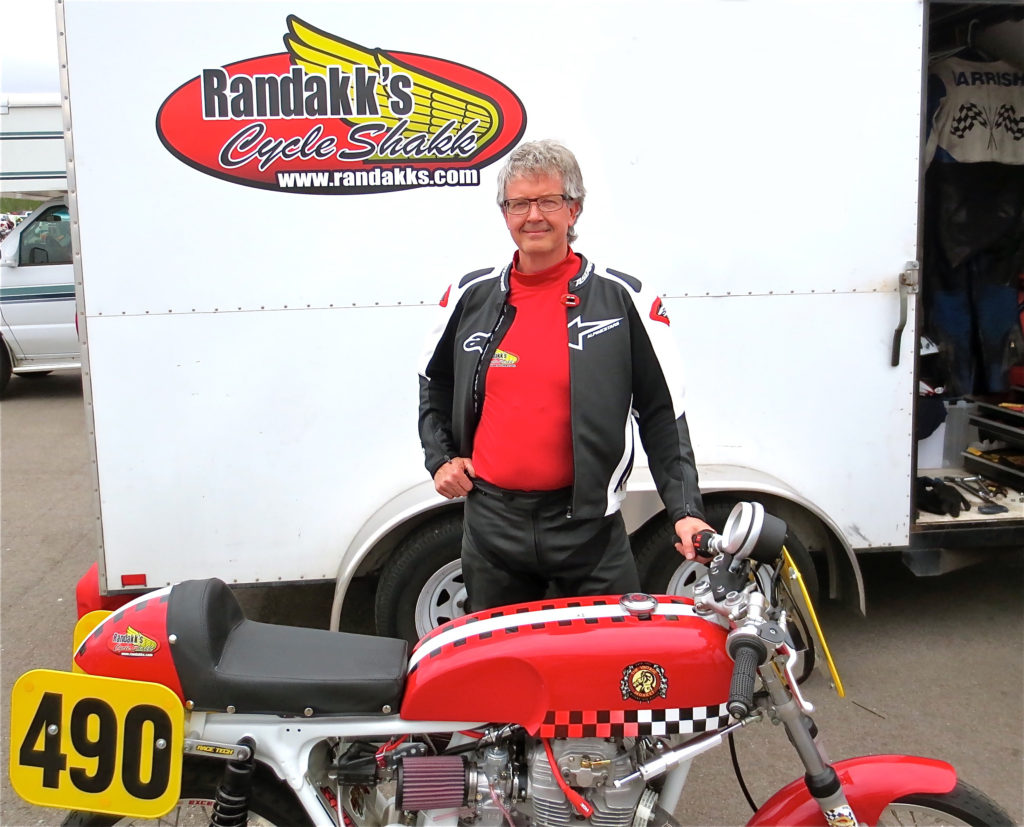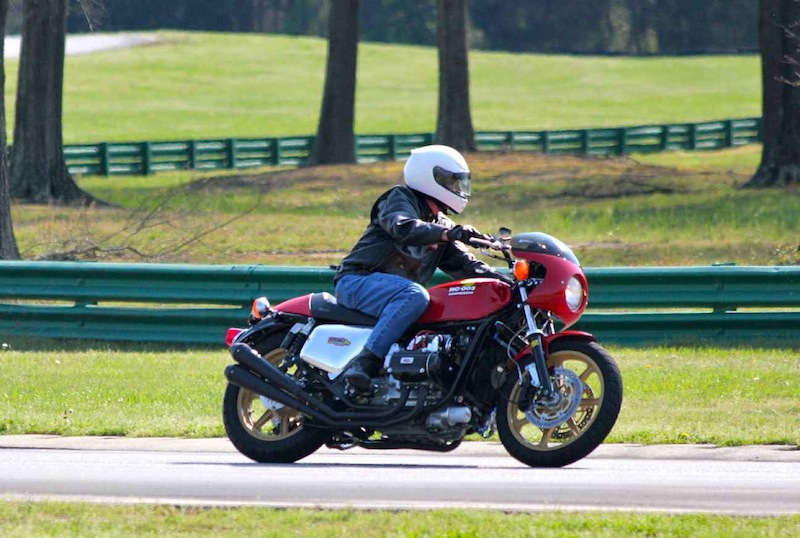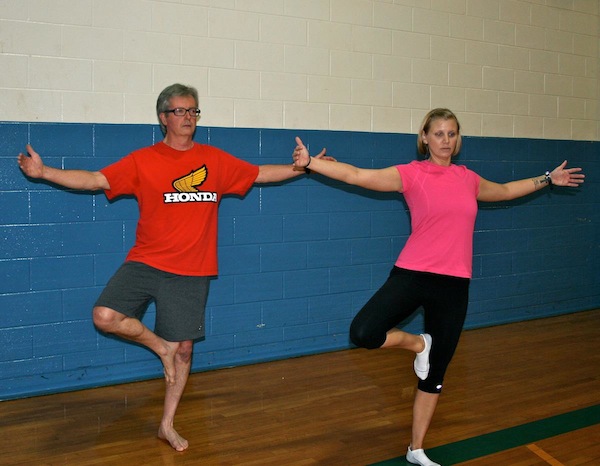Randakk’s Riding Skills – Introduction
Read Riding Skills Disclaimers
Motorcycling changed my life. I mean that quite literally. If there weren’t vintage motorcycle enthusiasts, there would be no persona known as Randakk. For that I am sincerely grateful. That I am able to earn a living immersed in such fabulous machinery is quite a blessing. This Riding Skills project is dedicated to my customers who make all this possible!

My passion for these machines is clearly mechanically based. As a youngster, I spent many vacations on the beaches of North and South Carolina. I remember once at Myrtle Beach a hapless fellow managed to run his rental Honda 50 into the swimming pool of our motel! My friends and I helped him fish it out of the deep end. Miraculously, after it dripped for five minutes and the rider steeled his frayed nerves, it fired on the first kick, burped a pint or two of water, and off it went! That was my first lesson in the superiority of Honda engineering. Variants of that model are known around the world as the Honda “Super Cub.” More than 60 million have been built, and it’s still in production and available just about everywhere . . . except America. More the pity, because I would buy a new one today in a heartbeat if I could!
When I first began to formulate my thoughts for this BLOG project, I naturally thought of all the well-meaning suggestions I’ve fielded from customers over the years. Many would make an excellent read if I ever got around to writing them. All such suggestions to-date have focused on various mechanical topics.
That’s not too surprising. My reputation in the industry is based on my minor status as a mechanical “wizard” focused on the intricacies of vintage motorcycle carburetion. Customers and other who know me might rightfully expect a book from Randakk to be on some “nuts-and-bolts” topic. At the risk of disappointing some of my audience, this BLOG content will have nearly zero mechanical content. It’s really about something much more important. The impetus is to pass along some vital information that will make you a better rider and allow you to enjoy the fabulous sport of motorcycling for as long as possible. Keeping my customers (and their bikes!) on the road is my real mission.
I’m indebted to many great teachers and mentors who generously shared their knowledge of riding, made me a better rider and challenged me to help others improve. I’ll mention them in context as the project unfolds. If this prompts only one action on your part, make it count: do as I have done and read everything significant that been written on the subject of better riding. I’ll include a Recommended Reading List to get you started.

One of my life goals is to ride motorcycles into my 90’s. Not just ride, but ride them well! I’m not kidding – this is a serious endeavor that is shaping large chunks of my life.
This is not a trivial ambition. Success will require more than optimism and wishful thinking. I’m an excellent rider by any reasonable standard today (age 59 as of this writing). To enjoy the sport of motorcycling 3+ decades from now would be a significant accomplishment. It won’t happen by accident (no pun intended). Lots of uncontrollable external factors could thwart my plan. Nevertheless, the idea of it all has captivated my attention and energy. If I make it, lots of very positive things must happen and lots of very negative things (like premature death!) must not. I have a plan and it’s working beautifully so far!
By design – my approach is definitely “off-beat” and non-traditional …. covering lots of “off the bike” skills development. For example, I’ve undertaken some ballet training as part of a critical focus on sharpening balance skills.
Ballet training is an intentionally preposterous idea (with lots of merit) designed to shake up rigidly held notions. I challenge my readers to question what they know and come to terms with what they might learn.

Before I get into the specifics, let me say that I’ve been very blessed in my life. To be able to indulge such a goal is a testament to the marvelous standard of living we enjoy in America. Less fortunates in the world must deal with poverty, hunger, disease, war and other everyday realities much more daunting. I’m very grateful for the hand I’ve been dealt in life. Among my many blessings are:
- Beautiful, talented & loving wife
- 2 great sons
- Well-travelled
- Good economic fortunes
- Excellent health (and cancer survivor!)
- Great customers
The lure of motorcycling is hard to explain to many, but probably not you. Motorcycling requires relaxed concentration that is highly engaging. By definition, riding a bike means you’re not doing taxes, attending a business meeting, taking out the trash or any number of other less satisfying activities. Throw in good scenery, fresh air and exquisite mechanical art and engineering and you have something special.
Honestly, I wouldn’t trade places in life with any celebrity, tycoon, politician, rock star or anyone else. My purpose is to share some information that’s been meaningful in my life framed in a somewhat relevant context. As a vintage Honda specialist, perhaps my “bully pulpit” will allow me to share some useful information you might not have expected.
Before we dig into this, here’s some preliminary advice from Randakk.
Some of this is “old wine in a new bottle.” Some is original. Ignore at your own peril!
- Protect yourself and your very valuable classic bike. Take a safety course! MSF offers excellent beginner and experienced rider courses throughout the country. I’m a big believer in these courses. Even though I’ve been riding for 35+ years, I’m still learning how to be a better rider. I recently took the ERC course and learned quite a bit.
- Always wear a helmet.
- Wear the best protective riding gear you can afford on EVERY ride.
- Use on electric vest in cool weather. Wear a ventilated jacket in warm weather. Add an evaporative vest when it gets really hot. Keeping your core body temperature regulated is vital for safe riding.
- Ride at least once a week to keep your skills sharp. If your climate does not permit this – ride indoors or move to a better climate!
- Read everything you can get your hands on regarding riding skills and safety.
- Find a good woman and keep her happy. This takes real work – do the work! Here’s a tip: women are different from men. The obvious differences are easy. The subtle ones are not easy. Make it your studied purpose to listen and understand. A partner who understands and tolerates your motorcycling passion is an absolute minimum requirement. One that actually enjoys motorcycling as a shared pursuit is a real plus! Plus, married men are healthier, live longer, eat better, sleep better and are measurably happier compared to single men.
- Don’t be an embarrassment to yourself and other men. Learn how to fix things. Get happy with your hairline. Know something useful about politics, sex and religion. Read beyond the Sports Page. Don’t eat crap. Drink fine spirits in moderation. An occasional cigar won’t kill you. Don’t curse unless you can do so with flair.
- Get a good physician and have a annual physical. Follow your doctor’s advice.
- Get a comprehensive eye exam every year.
- Get your eyeglass prescription filled by an optician who rides motorcycles…getting the “sweet spot” adjusted on “progressive” type lenses can make a huge difference in your vision performance.
- Wear earplugs when you ride.
- Don’t ride when angry, upset or over-tired.
- Ride a bicycle often to improve balance, fitness and 2 -wheel handling skills. Important – convert your bicycle’s front brake to right lever activation. This is an easy conversion. Get a bicycle shop to assist if necessary. This is critical! You don’t want to confuse your brain with extra processing to decide how to operate the front brake!
- NEVER ride after drinking.
- Outfit a good workshop.
- Buy some good hand tools. Life’s too short to use junk tools!
- Don’t put loud exhausts on your bike. The usual amateur result is a bike that runs poorly, makes more noise, makes less power and will cause rider fatigue much sooner. Worse, loud pipes reinforce negative stereotypes about bikers among the non-riders. There are large factions that would be perfectly happy if motorcycling were regulated and legislated out of existence. These folks don’t need any more ammunition. I’m about as pro-motorcycling as anybody you’re apt to meet, but few things upset me as much as straight pipes outside my open window at 3 AM.
To be covered, but not necessary in this order:
Randakk’s Riding Method – Better Motorcycling After Age 50
Table of Contents
Part I: Preliminaries
- Introduction / Philosophy / Approach
- Disclaimers
- Recommended Reading
- Bike “Fit” Issues
- Riding Gear!
Part II: Physical Development – Foundation (“Ballerina Biking!”)
- Balance
- Vision Skills
- Strength
- Flexibility
- Relaxed Muscle Readiness / Coordination
Part III: Riding Skills Development
- Steering
- Cornering
- Braking
- Slow Speed Maneuvers
- High Performance Skills (Track Day Training)
Part IV: Optimal Riding
- Simultaneous Processing Skills
- “Cognition Speed” Development (lifetime pursuit)
- Spatial Awareness (Situational Awareness?)
- “Off-the-Bike” Skills Development
- Synthesized Riding: “Line of Grace”
- Focus (Zen Stuff)
- “Familiarity Trap”
- Distraction issues
Part V: Competition Riding
- Competition Riding (content by AHRMA National Champion Dennis Parrish)
- What I’ve Learned From AHRMA Vintage Roadracing


You make many valid and important points here – many that get forgotten over a long period of riding. I have ridden for 56 years and have probably gotten a little lax over the past few years. Working on bikes more than riding them has probably reduced some of my keen riding skills. The last riding course I took was about 25 years ago and it was a very demanding police riding course (somewhat modified). Your approach reinforces my need to take some updated riding courses but maybe not the ballet.